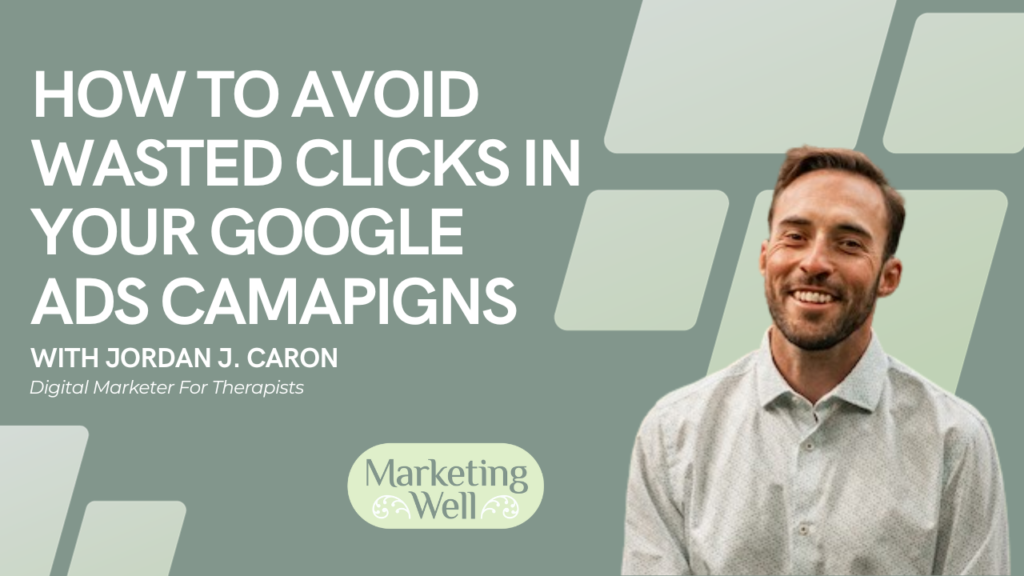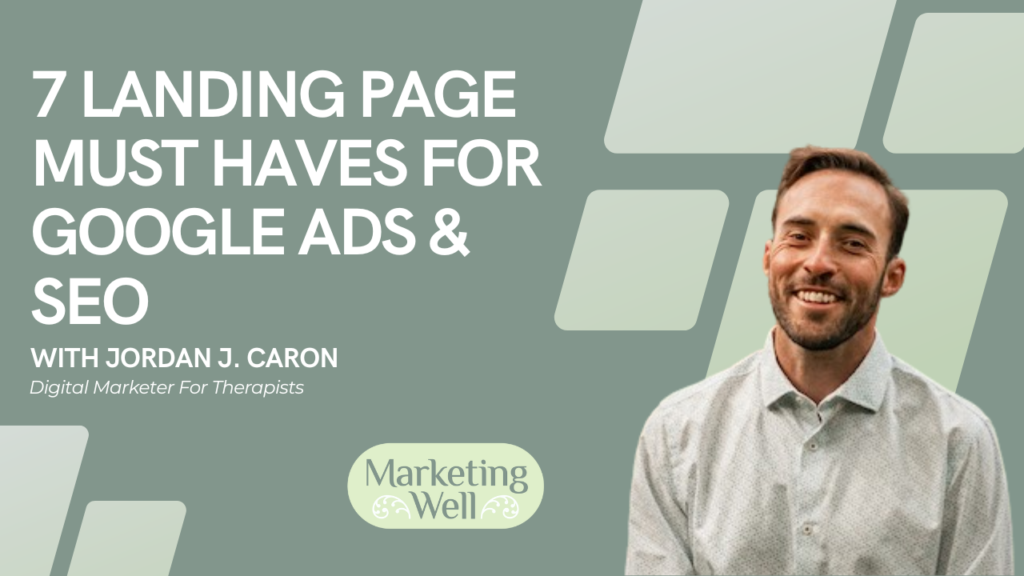Greetings, Jordan Caron here, delving into the intricacies of digital marketing for therapists. In this video and accompanying blog post, I aim to dissect the disparities between keywords and search terms within Google Ads campaigns. If you are managing your own Google Ads campaign, pay close attention because I will probably save you a bit of money and ensure you’ll get more targeted people clicking on your ads and visiting your website. Learn more about my Google Ads for Therapists service as well.
Keywords Vs Search Terms Are Totally Different
I navigate through a client’s account, illustrating the disparities between a keyword and the precise search terms that prompted clicks on this client’s ad. The campaign revolves around the theme of anxiety, featuring keywords like “anxiety therapists” and “anxiety therapist.” These keywords operate under the broad match type, implying a broad correlation to anxiety therapists. Initially, this approach aimed to garner clicks to the client’s site, a strategy with which the client concurred. However, I draw attention to this to underscore the potential for wasted clicks and the risk of attracting an audience misaligned with your objectives.
Let us look at these two keywords initially. They appear deceptively similar, with slight variations in plurality. A glance reveals 30 clicks, approximately 870 impressions, and a commendable click-through rate. However, let us not dwell on these metrics for now. Instead, let us delve into the search terms’ specifics to understand these clicks and people better.
Upon highlighting these keywords, we transition to the search terms tab to unveil the exact search terms that users entered before clicking on this client’s ad. The results are revealing. Some terms loosely pertain to anxiety, such as “anxiety symptoms,” with 29 users typing this phrase, leading to three clicks at a cost of $8. Yet, “anxiety symptoms” diverges from the intent of someone actively seeking an anxiety therapist. It reflects a preliminary research phase rather than an immediate requirement for therapeutic intervention.
Another term, “CBT therapy,” appears entirely unrelated. While the user might indeed experience anxiety and seek CBT therapy, the divergence warrants a separate adgroup and landing page. This aligns with the principle of creating specific webpages to target mental health issues and types of therapies.
The incongruities persist with terms like “hypnosis for OCD.” This strays into a realm beyond anxiety, focusing on obsessive-compulsive disorder. The question arises: Why does Google display such terms for individuals actively seeking anxiety therapists? Furthermore, why do users click on these seemingly unrelated ads? This conundrum introduces a psychological dimension, delving into the motivations behind user behaviour.
An anomalous entry, “panita panopitch,” leaves one bewildered. They are a counsellor in Victoria, BC, and the pertinence to anxiety therapists is dubious. The client, unfortunately, incurs a cost of $2.53 for clicks stemming from such obscure search terms. This scenario, if recurrent, could accumulate substantial expenses, underscoring the imperative to manage and optimize your Google Ads campaign proactively.
Two Ways To Combat Wasted Clicks
To mitigate these challenges, two strategies present themselves.
1- The first involves transitioning from a broad match type to an exact match for keywords. While this demands an initial time investment to add keywords meticulously, it ensures that your ads exclusively trigger for the precise search terms you target. This cheat sheet streamlines this process, requiring only the adjustment of city names to cater to specific locales.
2 – The second strategy entails ongoing vigilance and the identification of negative keywords. You can compile a list of negative keywords by scrutinizing search terms and discerning incongruous entries. This ensures that your ad refrains from triggering any search term incorporating those negative keywords. However, this method demands continual monitoring, as novel and peculiar search terms may periodically surface.
In conclusion, whether you opt for the precision of exact match keywords or the diligence of negative keyword management, the overarching objective remains consistent:
- Economize your budget and attract a more pertinent audience to your website.
- If navigating this terrain proves daunting, consider enlisting my consulting services to navigate the intricacies of Google Ads, ensuring judicious spending and optimal targeting.
- Share this knowledge within your therapist network, fostering fiscal prudence and strategic advertising practices.
May this discourse empower you in navigating the nuanced realm of online advertising?




